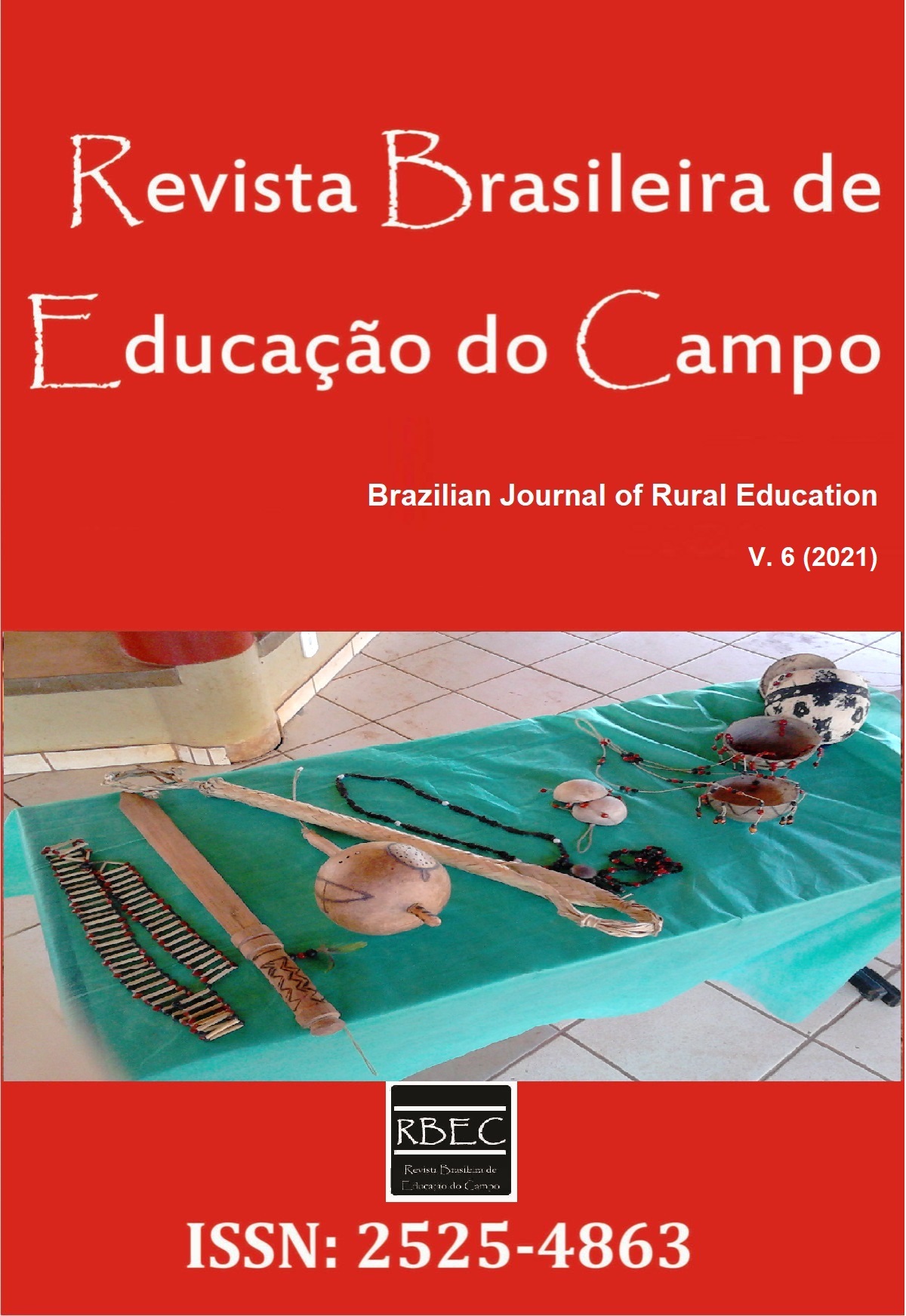When pray is singing, when singing is pray: educational trajectory of a Collective of Singing and Playing in the Kilombola Rural Education
DOI :
https://doi.org/10.20873/uft.rbec.e9057Mots-clés :
rural education; quilombola education; education of ethnic-racial relations; culture.Résumé
ABSTRACT. This article presents the description and analysis of a cartographic research for the construction of a prayer song sung in the terreiro in praise of the Orixás. The cartography (Deleuze & Guatari, 1995) is an “intervention-research” (Kastrup et al, 2015) that allowed us to collectively organize the research songbook When pray is singing, when singing is pray as a map, though partial, of cultural events taking place in the Kilombola community Morada da Paz, at the same time that it allowed us to deepen in the popular Brazilian music to get to know songs that have as their theme the praise of the Orixás. As a result of this research, in addition of a cancioneiro that was presented in different educational spaces for three years, we organized workshops with themes related to education for ethnic-racial relations, rural education and Kilombola education. We relate these contents to a proposal for education in the Kilombola field, based on the articulation of the pedagogy of the landless movement (Caldart, 2000) to the Kilombola education guidelines, education for ethnic-racial relations and enchantment pedagogy.
Téléchargements
Références
Acosta, A. (2016). O bem viver: uma oportunidade para imaginar outros mundos. SP: Editora Elefante. https://doi.org/10.7476/9788578794880.0006
Acselrad, H. (Org.) (2008). Cartografias sociais e território. Rio de Janeiro: IPPUR/UFRGS.
Caldart, R. S. (2000). Pedagogia do movimento sem-terra. SP: Editora Expressão Popular.
Cunha, A. G. (2007). Dicionário etimológico da língua portuguesa. Rio de Janeiro, Lexikon.
Deleuze, G., & Guattari, F. (1995). Mil platôs: capitalismo e esquizofrenia. l1. Rio de Janeiro: Ed. 34.
Diretrizes Curriculares Nacionais para a Educação das Relações Étnico-Raciais e para o Ensino de História e Cultura Afro-Brasileira e Africana. (2004). Brasília, MEC/SECADI.
Flores, L. D. (2018). Ocupar: composições e resistências kilombolas (Tese de Doutorado). Universidade Federal do Rio de Janeiro, Rio de Janeiro.
Foucault, M. (2018). Microfísica do poder. RJ/SP, Paz e Terra.
Hawany, T. (2017). Àdúrà, oríkì, ọfọ̀, ìtàn e orin. Recuperado de http://www.thonnyhawany.com/2017/02/adura-oriki-ofo-itan-e-orin_16.html.
Jost, M. (2015). A construção/invenção do samba: mediações e interações estratégicas. Revista do Instituto de Estudos Brasileiros, 62, 112-125. https://doi.org/10.11606/issn.2316-901X.v0i62p112-125
Kastrup, V., Passos, E., & Escossia, L. (2016). Pistas do método da cartografia: a experiência e o plano comum. Porto Alegre, Sulina.
Kastrup, V., Passos, E., & Escossia, L. (2015). Pistas do método da cartografia: pesquisa intervenção e produção da subjetividade. Porto Alegre, Sulina.
Labrea, V. V., Sousa, G., & Ferreira, A. (2017). A mística na educação do campo e sua interlocução com a ecologia dos saberes: apontamentos de percurso. In Anais do III SIFEDOC, UFFN: Erexim/RS.
Labrea, V. V., Dornelles, D. F., & Kiekow, P. E. (2018). Cartografias da EduCampo: alternância, trabalho e estratégias para conter a evasão. RTPS – Rev. Trabalho, Política e Sociedade, 3(4), 151-170. https://doi.org/10.29404/rtps-v3i4.3634
Labrea, V. V., Kiekow, P. E., & Dornelles, D. F. (2019). Cartografia subjetiva em território feminino kilombola: em busca da utopia do bem viver. Cadernos do Lepaarq, 26(31), 107-120. https://doi.org/10.15210/lepaarq.v16i31.14836
Labrea, V. V. (2020). Pedagogia do Encantamento e Ekonomia do Afeto: cartografia subjetiva em território feminino kilombola. Relatório Final do Projeto de Pesquisa e Extensão. Porto Alegre, FACED/UFRGS.
Lei no. 11645 que altera a Lei no 9.394, de 20 de dezembro de 1996, modificada pela Lei no 10.639, de 9 de janeiro de 2003, que estabelece as diretrizes e bases da educação nacional, para incluir no currículo oficial da rede de ensino a obrigatoriedade da temática “História e Cultura Afro-Brasileira e Indígena”. Brasília, D.O.U. de 11.03.2008.
Lei no 10.639, de 9 de janeiro de 2003. Altera a Lei no 9.394, de 20 de dezembro de 1996, que estabelece as diretrizes e bases da educação nacional, para incluir no currículo oficial da Rede de Ensino a obrigatoriedade da temática "História e Cultura Afro-Brasileira", e dá outras providências. Brasília, D.O.U. de 10.1.2003.
Marcos Normativos da Educação do Campo. (2012). Brasília: MEC/SECADI.
Prandi, R. (2001). Mitologia dos Orixás. SP: Companhia das Letras.
Ribeiro, D. (2017) O que é lugar de fala. Belo Horizonte, Letramento.
Resolução no. 342, de 11 de abril de 2018. Consolida as Diretrizes Curriculares da Educação Básica nas Escolas do Campo e estabelece condições para a sua oferta no Sistema Estadual de Ensino. Porto Alegre, Conselho Estadual de Educação.
Resolução no. 8, de 20 de novembro de 2012. Define Diretrizes Curriculares Nacionais para a Educação Escolar Quilombola na Educação Básica. Brasília, MEC/CNE.
UFRGS. Novembro Negro. Recuperado de: https://www.ufrgs.br/novembronegro/quem-somos/. Acesso em 19/03/2020.
UFRGS. (2013). Projeto Político Pedagógico do Curso de Graduação Licenciatura em Educação do Campo. Porto Alegre, FACED/Programa Especial de Graduação.
UFRGS. (2018). Projeto Político Pedagógico do Curso de Graduação Licenciatura em Educação do Campo. Porto Alegre: FACED/Programa Especial de Graduação.
Téléchargements
Publié-e
Comment citer
Numéro
Rubrique
Licence
Proposal for Copyright Notice Creative Commons
1. Policy Proposal to Open Access Journals
Authors who publish with this journal agree to the following terms:
A. Authors retain copyright and grant the journal right of first publication with the work simultaneously licensed under the Creative Commons Attribution License that allows sharing the work with recognition of its initial publication in this journal.
B. Authors are able to take on additional contracts separately, non-exclusive distribution of the version of the paper published in this journal (ex .: publish in institutional repository or as a book), with an acknowledgment of its initial publication in this journal.
C. Authors are permitted and encouraged to post their work online (eg .: in institutional repositories or on their website) at any point before or during the editorial process, as it can lead to productive exchanges, as well as increase the impact and the citation of published work (See the Effect of Open Access).














